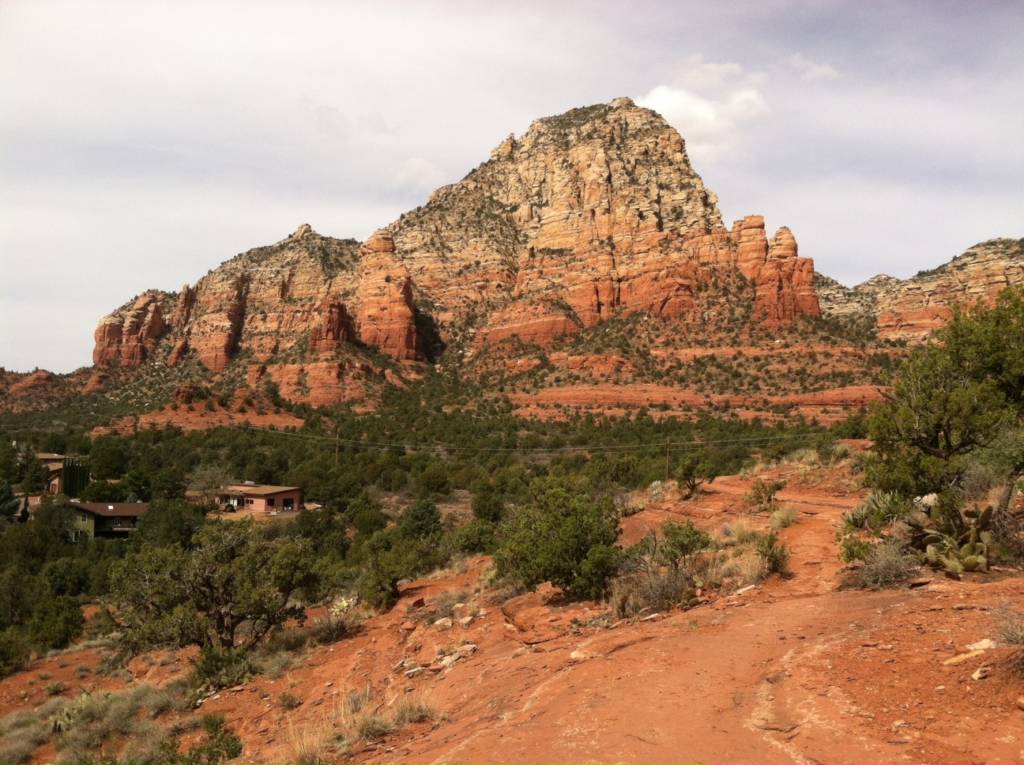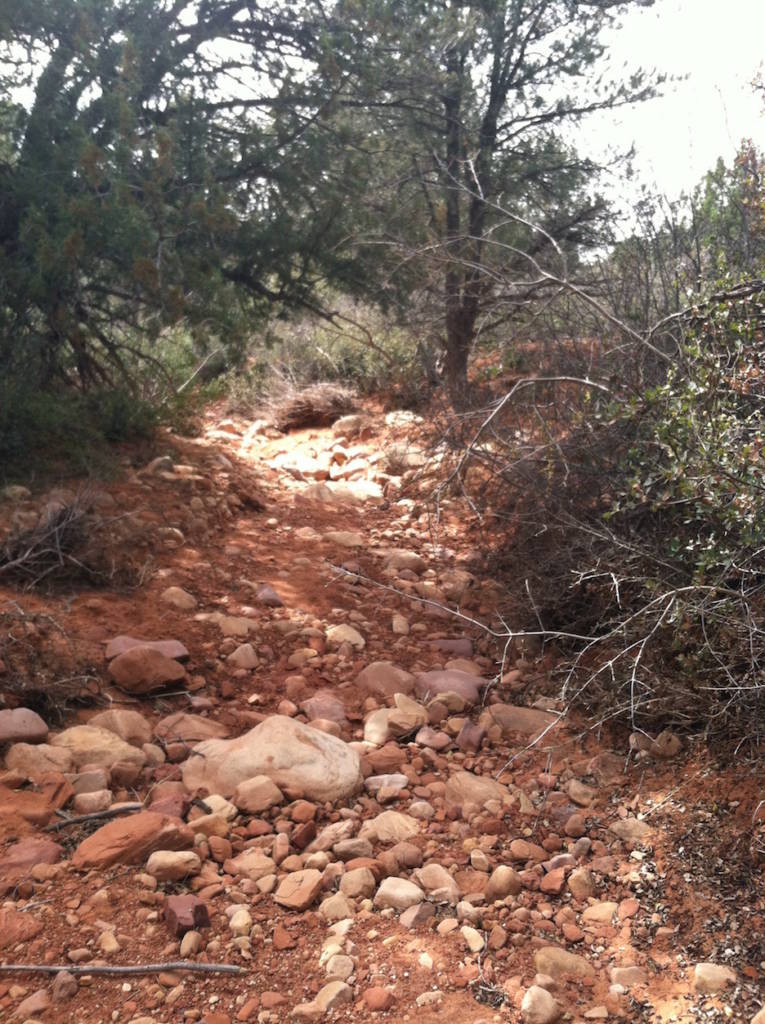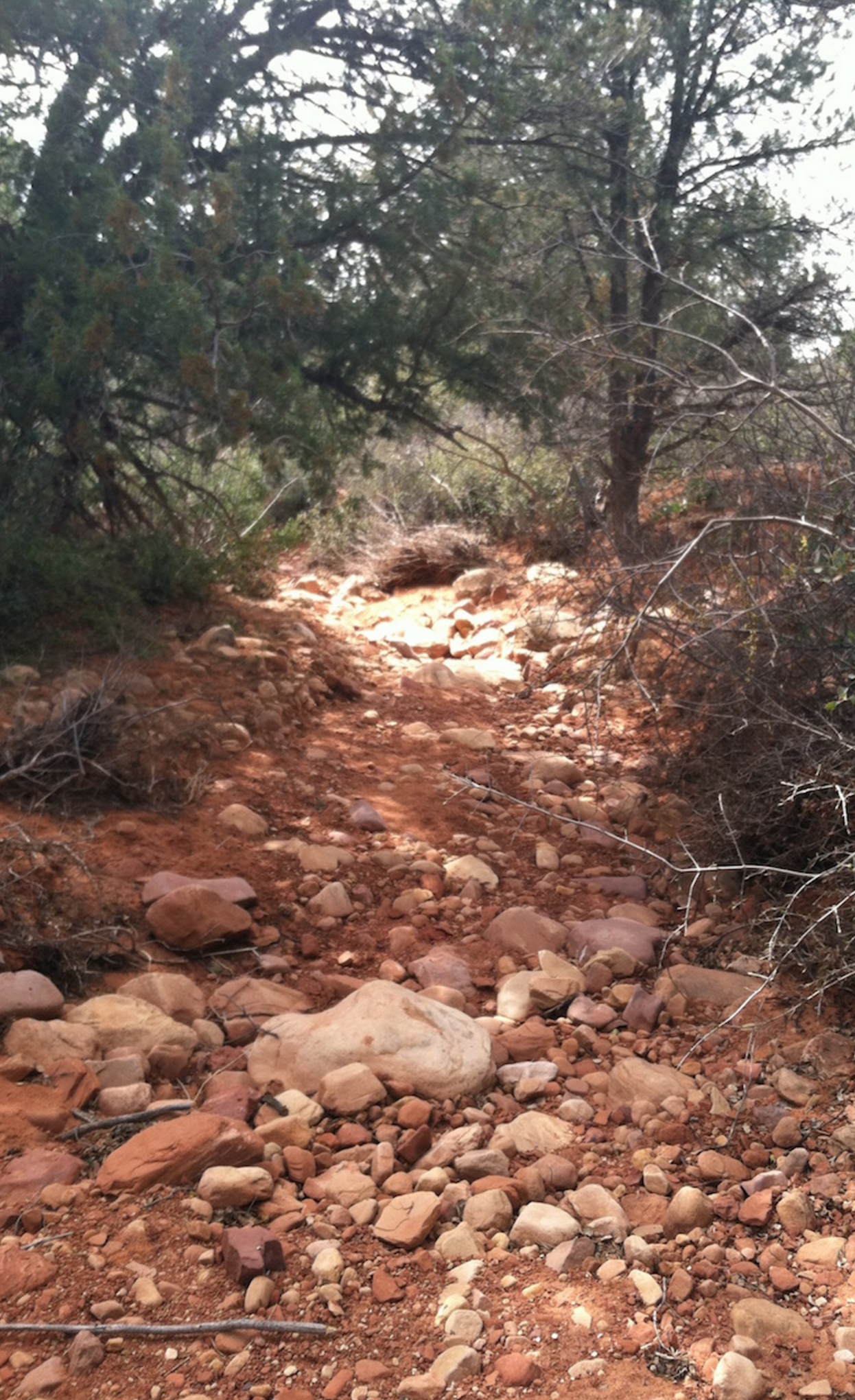I bring my husband home to show him my secrets.
We both come from famous places. He’s from Nashville, I’m from Sedona. We one-up each other: He saw Porter Waggoner pushing a mower and Chet Atkins at the golf course. I served Bruce Springsteen a chocolate ice cream; Ted Danson’s folks banked with my mom.
We both have watched the places we knew by heart disappear. When we return, I point out what used to be there instead of what is—that tourist shop was the Cornet where we played video games and bought our sewing patterns, that restaurant was a bus stop, that theater was the old Bashas’ with the upstairs seating where I’d sit with a maple longjohn before walking home, those condos were the field where we built forts in the junipers.
Sometimes these old ghosts shimmer. Sometimes they rattle my chains.
Often when I bring him here, I feel as if I’m wrestling down prey and giving it to him as an offering. Here, this is because I love you. Please take it. Please let me know I’m still good.
What doesn’t change: the rocks, the famed red spires and cliffs that adorn magazine covers. I have climbed them throughout my life, my hands and feet pressed against their fragile, porous surfaces, coming home with their grit on my scuffed knees, crimson dirt in the cuffs of my jeans. I wonder if perhaps this intimacy was mutual: the rocks absorbed my salt and breath and skin cells the way they soak up water. Maybe that’s why I still dream of them—climbing, flying over, falling off. Not because of mysticism or geology, but history. They remember.

This visit we go into the state land behind my childhood home, a wonderland of dirt and shale and shrubs in the shadow of Greyback and Sugarloaf mountains, beneath caves where bats flew out at dusk. My most secret, most special place.
A parking lot sits where there once was nothing but shrub oak and cat claws. Tourists with walking sticks and multipocket vests wander blazed trails where once there was nothing but cowpaths.
But there—the ravine, the one I played in as a child. Dry washes, we call them, channels carved by rains and flash floods. A world within a world—my own little world, back in the days ruled only by light and dark, hunger and thirst, when I’d sit with a book pressed against the side of the wash, scrape the soft rocks to make powder that I’d rub into my cheeks like blusher.
I am in the middle of writing a novel that features a wash modeled on this very one. The pretense is that I need to see it again to make sure I am getting it right for its fictional version, and that is true.
But it is also true that I need it for me. To ask, again: How could such a beautiful place bruise the tenderest parts of me?
After all these years away, I can’t pin it down. Most days the answer is simply adolescent angst, when I became intensely aware of my strangeness and my body through the myriad ways children torture one another, amplified by small-town visibility, an absolute lack of anonymity. Nowhere to hide. Except outside, in the shelter of the land.
Today, with my feet scuffing the surface of those old stomping grounds, I see how my body and this body of land became intertwined. Like the place, my emotions swelled larger than life, monstrously large, enough to swallow me whole.

In my secret place, now open to a world of visitors, I try again to tell the man I love about the girl I was once. I tell him and tell him and tell him about what no longer exists but what I cannot stop seeing. Perhaps I tell him to make it real again. Or to make myself real—to resurrect the girl part of me, the odd kid who read like a motherfucker and walked in ditches and saw beauty and love in so much around her that it hurt. Perhaps this is why I finally have come home in my writing. To her place.
More and more, I wonder if this impulse is about forgiveness, though I don’t know whether I am seeking it, or offering it, or what, exactly, needs to be forgiven. I only know that it brings me to my knees.
The light is fading. Time to go. I bend and grab a yellow mesquite pod. I rub its nodules and shake it, assured to hear the seeds rattle. I take my beloved’s hand. Together we watch the rocks darken in the waning light.
Bryn Chancellor’s debut novel, Sycamore, is forthcoming from Harper (May 9, 2017). Her story collection When Are You Coming Home? won the Prairie Schooner Book Prize, and her short fiction has appeared in Gulf Coast, Blackbird, Colorado Review, Crazyhorse, Phoebe, and elsewhere. Other honors include the Poets & Writers Maureen Egen Writers Exchange Award and literary fellowships from the Arizona and Alabama state arts councils. A native of California raised in Arizona, she holds an MFA in fiction from Vanderbilt University and is an assistant professor at the University of North Carolina at Charlotte.




